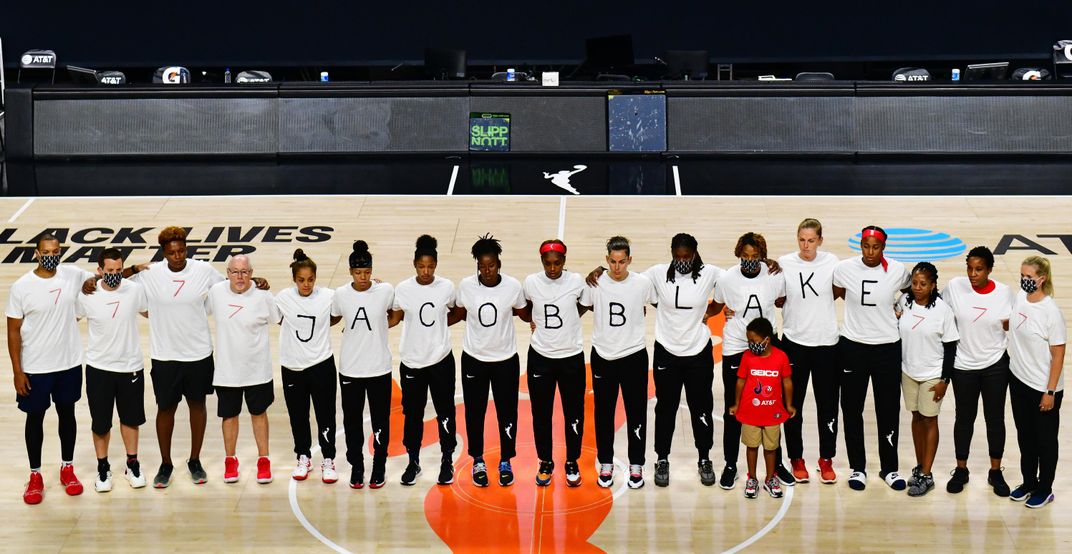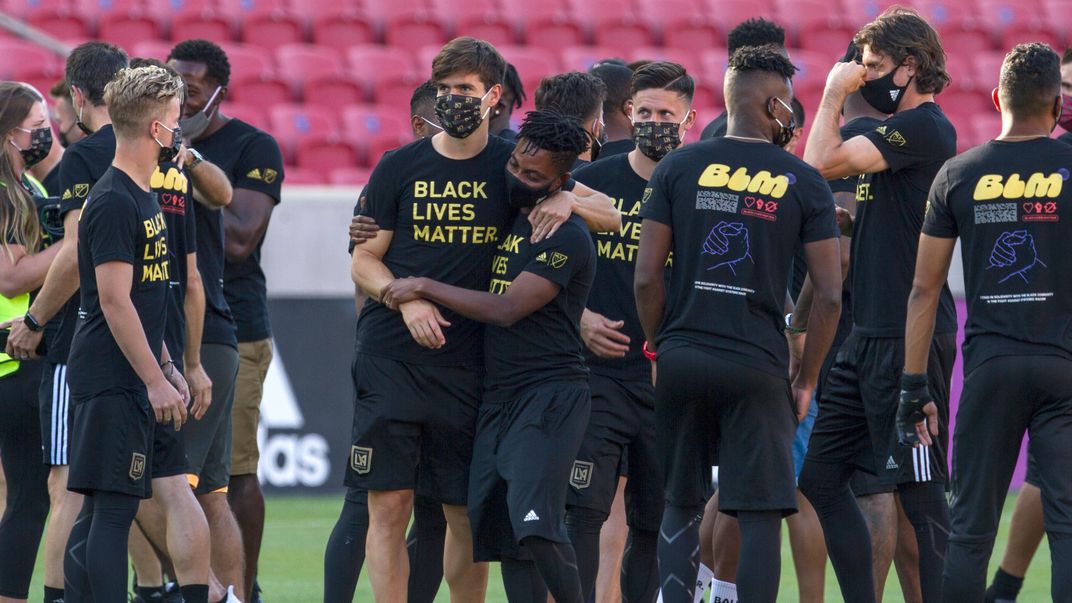Athletes Shut Down Sports to Protest Police Brutality
A sports curator at the Smithsonian provides his thoughts on the past and future implications of the events of the week
:focal(1917x1640:1918x1641)/https://tf-cmsv2-smithsonianmag-media.s3.amazonaws.com/filer/a1/a5/a1a5c3a7-ec13-40dc-8d5b-3f7fb0ffbdc7/ap_20239772788842.jpg)
On Wednesday afternoon, the National Basketball Association (NBA) was expecting a triple-header of hotly anticipated playoff games inside the so-called bubble at Walt Disney World near Orlando, Florida.
But as tipoff for the first of those games approached, the Milwaukee Bucks were not on the court.
As a team, the Bucks were reeling following the shooting of Jacob Blake, a 29-year-old black man, in Kenosha, Wisconsin who was shot in the back seven times by law enforcement roughly 40 miles south of the Bucks’ home court on Sunday, August 23. Blake is alive but one of the bullets nearly severed his spinal cord, paralyzing him from the waist down, reports Leah Asmelash for CNN.
The shooting revived public demonstrations against systemic racism across the country that had followed the police killings of George Floyd in Minneapolis, Minnesota, and Breonna Taylor in Louisville, Kentucky.
In protest of this latest example of police brutality, the Bucks decided they would not be playing any basketball. As news of what some legal scholars say should properly be called a wildcat strike spread, the rest of the NBA, the WNBA, as well as teams in Major League Baseball, Major League Soccer, and professional tennis followed suit and opted out of scheduled competition, reports Ben Golliver for the Washington Post. On Thursday, the National Hockey League (NHL) announced it too would cancel games scheduled to occur on Thursday and Friday despite several teams having taken to the ice on Wednesday as events were unfolding, according to a joint statement issued by the NHL and the NHL Players’ Association.
At the time of publication, a statement from the NBA indicated that the league and its players have reached a tentative agreement to resume play starting on Saturday, with commitments to further engage on the topic of social justice and to, where possible, establish voting centers at NBA arenas.
To help place this latest wave of protests by athletes in historical context, Smithsonian magazine spoke with Damion Thomas, a sports curator with the Smithsonian National Museum of African American History and Culture, on Thursday afternoon.
What is it about sports that seems to so often place them at the center of social issues for the African American community?
From the beginning of African Americans' participation in sports, it's been political. The Olympics and other moments in sports history have identified sport as a place that has meaning beyond the playing field. Sports were one of the first places where African Americans could compete on relative terms of equality and athletes have tried to use that platform to advocate for equality. So sports have always been intricately tied into the African American struggle for greater rights and freedoms.
Where does the current movement fit into the broader history of black athletes protesting inequality and police brutality?
It's a difficult question to answer because we are in the middle of it. But this current moment of protest and social engagement is important, because it is one where we're seeing all aspects of society be asked to respond to the issues that we're witnessing. While sports have high visibility, they're not alone in being asked to respond and to contribute to social advancement.
What’s the role of these athletes within the movement? If the players in the NBA decide to resume play this weekend, does that reframe this moment?
In a way, we have to be careful that we don't overestimate the power of the athletes. In my study of history, I don't see athletes leading social revolutions, and I don't think that's the case right now. Masses of people have gone into the streets to protest, and athletes have responded to the activism of the people. Those protests might be identified with a particular city, state or a particular group of people.
But when athletes become involved, their platforms are so large that the conversation becomes nationalized. People get exposed to it who might not have otherwise—that’s the role of athletes. Then the masses get inspired by the involvement of athletes. It's that synergy between the critical mass of people and the prominent athletes, entertainers and leaders that's important to recognize and understand.

The WNBA has been at the forefront of trying to put a spotlight on social issues for years now, even predating Kaepernick.
Certainly. The WNBA has very early on decided that it was going to be a sports league that is devoted to social justice in a variety of areas—from race relations, to gender equality, to LBGTQ issues. The WNBA is a league that is committed to using this platform for fighting for social justice.
Why do you think that is? What brings about that commitment?
It’s a complicated question. The birth of the WNBA was about creating a space where women can be recognized as professional athletes. From its very inception, it's been a place that has fought for equality. Female athletes have had to fight for equitable pay as well as equal access to facilities and endorsements. The WNBA's engagement with a lot of these social issues around gender, sexuality and race are tied with the ability to compete in the first place.
What about the way that this has gone across from basketball to other sports—what do you think that says about this movement and this moment?
It’s important to look at the transformation of the engagement, moving from, let's just take 2016 and Colin Kaepernick, and then other football players become engaged, and then the basketball players become more engaged. At the time, there was only one baseball player, Bruce Maxwell, who took a knee in one of the final games of the MLB season. To then move, four or five years later, to teams taking knees across multiple sports and deciding to boycott games—that speaks to the shift, it speaks to the growing power of this particular movement to draw attention and to become mainstream.
Four or five years ago, it might have been controversial to say “black lives matter,” and it has now become part of the American lexicon. That's an important, significant moment.
Do you see that progress as having been steady and incremental, or as something that happened rapidly over the last six months?
Progress is never steady and incremental. Progress is always a battle ground, and you have some victories, you get some defeats. Often those things are happening simultaneously. It’s something that requires constant struggle. And it happens in different communities, in different subsets of people at different times.
When Kareem Abdul-Jabbar boycotted the 1968 Olympics he dealt with massive backlash. In the NBA there was also the lesser known example of Craig Hodges essentially being frozen out of the league like Kaepernick was in the NFL. Today, team owners and entire leagues have come out in support of their players taking a stand, despite the fact that the strike will cost the team money and may be in violation of the players’ contracts. What do you make of this shift?
I'm reminded of the words of Reverend Dr. Martin Luther King Jr, who said, "Leaders don't follow public opinion. They make public opinion."
It's important that you have some trailblazers who are willing to lead and to be out front, even when it's uncomfortable and unpopular. And eventually, if people are consistent and engaged, we've seen throughout history that opinion changes. What we are seeing right now is a shift of attitudes and perspectives on the issues that were often ignored and controversial just five years ago.
Do you see a significant difference between symbolic actions, whether it's raising a fist, taking a knee or wearing a T-shirt, versus walking out entirely or striking?
The different forms of protest resonate with different people, and you never know which is going to be the right action for the right moment. In certain moments, protesting might be the action that draws attention. At other times, the boycott might be the action that draws attention. It’s important for all Americans, athletes and other groups of people, to figure out how best to express their desires for a better and more inclusive future.
Do the athletes themselves need to make demands and see them met for this to have been a successful protest?
I don't think that that's true. You measure success in a number of ways. You can measure your success, one, by the fact that people are standing up for what they believe. That is a form of success.
Two, you measure success by how other people sort of take advantage of this heightened sensitivity to these issues. It doesn't necessarily have to be athletes directly advocating for something.
Three, you measure success by how this moment inspires others to take action. So, I think there are a number of ways, as I just laid out, to measure the success of the actions they've already taken.
What needs to happen next for us to, with the benefit of hindsight, judge this as standing out from other instances of protest by athletes?
What needs to happen is that there needs to be structural reform. If that happens, historians like me will look back and then tie that reform to these protests, not just the athletes, but the people in the streets. Otherwise, we might reference it and we might hear about it a bit more, but we won't see it as a watershed moment. What happens next decides how we'll look back and make determinations about its success or significance.
/https://tf-cmsv2-smithsonianmag-media.s3.amazonaws.com/accounts/headshot/alex.png)
/https://tf-cmsv2-smithsonianmag-media.s3.amazonaws.com/filer/1c/4b/1c4b5320-12f1-4f65-9248-883ee60495b9/gettyimages-1228218183.jpg)
/https://tf-cmsv2-smithsonianmag-media.s3.amazonaws.com/filer/c9/e4/c9e47fa0-3cbe-4658-84ce-f988f6ad2d98/gettyimages-1268953530.jpg)
/https://tf-cmsv2-smithsonianmag-media.s3.amazonaws.com/filer/9a/13/9a133ecd-ebd3-47a7-bae5-a801e8e1c604/gettyimages-1268929198.jpg)

/https://tf-cmsv2-smithsonianmag-media.s3.amazonaws.com/accounts/headshot/alex.png)